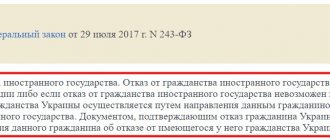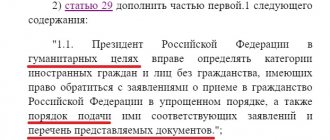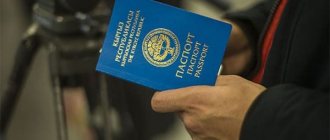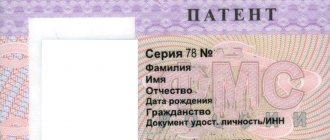In July 2021, it will be easier to obtain Russian citizenship
On April 24, Vladimir Putin signed Federal Law No. 134-FZ “On Amendments to the Federal Law “On Citizenship of the Russian Federation” in terms of simplifying the procedure for granting citizenship of the Russian Federation to foreign citizens and stateless persons.” The law comes into force after 90 days from the date of publication. The changes apply to immigrants from Belarus, Ukraine, Kazakhstan, Moldova, migrants married to Russians, graduates of Russian universities, as well as everyone who is registered under a simplified procedure. The changes come into effect on July 24, 2021.
Interesting facts to think about: in 2016-2018, the number of people who received Russian citizenship was approximately 250 thousand per year; 2019 already 487 thousand people. The entry into force of the current amendments makes us think about the future population of Russia and the state of the labor market.
Let's see what the new law has in store.
The main innovations are as follows.
1. Foreign citizens, regardless of the basis on which they apply for citizenship and what country they come from, will not need to renounce their citizenship. Previously, in order to apply for Russian citizenship, it was necessary to renounce existing citizenship.
2. Applicants for Russian citizenship from Belarus, Kazakhstan, Moldova and Ukraine, as well as persons specified in the Law who receive citizenship under a simplified procedure (see points 3, 4, 5, 6, 7 below) will not need to confirm income. That is, neither 2-NDFL, nor certificates of deposit, nor other documents on income will be required from candidates. Also, they will not need to live in the Russian Federation for five years with a residence permit.
3. Stateless persons, adults and capable, who are former citizens of the USSR, lived and live in states that were part of the USSR, and did not receive citizenship of these states, will be able to obtain Russian citizenship in a simplified manner without the need for a five-year residence permit and without confirmation income.
4. Migrants who are married to a citizen of the Russian Federation living on the territory of the Russian Federation and have children together do not have to wait three years after marriage and obtain citizenship immediately. To do this, they need to reside permanently or temporarily on the territory of the Russian Federation.
5. If a foreign citizen received professional education in Russia and after graduating from a university (technical school, college) officially worked in the Russian Federation for at least one year, then he can obtain Russian citizenship in a simplified manner.
6. Persons who have at least one parent who has Russian citizenship and resides on the territory of the Russian Federation can now obtain citizenship in a simplified manner.
7. In a simplified procedure, foreign citizens or stateless persons recognized in the manner prescribed by law as native speakers of the Russian language are also granted citizenship if these persons or their relatives in a direct ascending line permanently reside or previously permanently resided in the territory of the Russian Federation or in the territory belonging to the Russian Empire or the USSR, within the State border of the Russian Federation.
In general, along with the simplification of the naturalization of Russian people who remained “abroad” after the collapse of the USSR, there is also a simplification of obtaining citizenship “by marriage” and “by education,” which cannot but lead to abuses.
Author: Alexander Ulogov, lawyer.
If you find an error, please select a piece of text and press Ctrl+Enter.
How it was before adoption
Until 2021, namely until the adoption of the amendment, there were slightly different conditions for obtaining Russian citizenship. There were multiple schemes for simplified acquisition of citizenship, and there were many lawsuits due to disagreements in determining the rights and obligations of a person.
Many questions related to the registration and receipt of documents confirming the availability of documents on a residence permit and permanent place of residence.
Also previously there was the possibility of obtaining dual citizenship for foreigners. There were many disagreements with the process of conferring citizenship for children born in the country.
Therefore, with the development of migration relations and their requirements, the need to introduce amendments arose. These changes regulate the process of obtaining citizenship, as well as the necessary conditions, simplified options for obtaining, and situations concerning the children of repatriates.
This is interesting: Civil Marriage Law
Presidential Decree 2021 On Acquiring Russian Citizenship in a Simplified Procedure
Vladimir Putin signed a decree making it easier for Ukrainians who previously lived in any region of the Lugansk or Donetsk region of Ukraine to obtain Russian citizenship. Previously, only those living in the territory of the self-proclaimed DPR and LPR, which occupy only part of the two above-mentioned regions, could apply for a Russian Federation passport in a simplified manner. A family of nine came to Russia from the city of Torets, which is located on territory controlled by Kyiv. Vladimir Putin promised that he would assess the need for adjustments in legislation. In the country and the world.
In April, Putin explained his decision, which caused an extremely harsh reaction from Kyiv, on humanitarian grounds. In May, passport issuing points opened in the Rostov region, bordering areas not controlled by Ukraine. After the publication of Putin’s decree, Ukrainian President Vladimir Zelensky instructed the Ukrainian Foreign Ministry to develop a mechanism for granting Ukrainian citizenship to “ethnic Ukrainians from friendly countries.” We believe that this step creates additional obstacles to the de-escalation of the conflict and reintegration of Donbass,” the statement said.
We recommend reading: Dual citizenship Romania Russia
Documentation
In order to legalize the stay in the country at the legislative level, a foreigner will need the following package of documents:
- Official papers fully and plausibly reflect his personal data;
- Copies of all identification documents certified by a notary office;
- Medical certificates certifying that the applicant does not have serious illnesses or disabilities;
- A document reflecting the absence of outstanding criminal records in the territory of the country of previous residence, and a certificate stating that the repatriate does not have administrative fines in Russia.
- Paper confirming payment of state duty;
- Documents confirming the solvency of a foreign person.
This is interesting: How to confirm the status of a pensioner for life
For children, official representatives must provide a birth certificate of the child and a written agreement from one of the parents to grant Russian citizenship.
Simplified procedure for obtaining Russian citizenship in 2021
The standard scheme for processing Russian documents does not provide preferences for ordinary applicants and allows a limited number of foreigners to settle in their second homeland. Firstly, acquiring Russian citizenship requires obtaining a temporary residence permit under quotas. Entry is limited throughout the country; for example, in Moscow no more than 2 thousand permits are issued annually. Secondly, to move in you cannot do without a residence permit, a certificate of good conduct, a permanent source of income, and knowledge of spoken and written Russian. In the best case, the process lasts at least five years.
For Russian-speaking foreigners from near and far abroad, Russia has developed regulations that allow them to quickly and without bureaucratic delays settle in their historical homeland. Russian citizenship in a simplified manner is a way to reduce the standard waiting period of 5 years. The maximum period for consideration of the issue is no more than three years.
News Politics
According to the decree, the right to obtain Russian citizenship in a simplified manner now has citizens of Ukraine who do not have citizenship (nationality) of another state, who were born and permanently resided in the territories of the Republic of Crimea and Sevastopol, who left the specified territories before March 18, 2014, as well as their children , including adopted children, spouses and parents.
The simplified procedure for obtaining Russian citizenship will also apply to foreigners and stateless persons who themselves or their relatives in a direct ascending line, whose adoptive parents or spouses were illegally deported from the territory of the Crimean Autonomous Soviet Socialist Republic.
Changes to citizenship for children
The law on obtaining citizenship also regulates the specifics of assigning status to minor children. If a child was born into a Russian family, the corresponding status is assigned automatically. It does not take into account in which country the person was born. No special documentation is required. However, proof of appropriate status may still be required. Thus, the procedure is performed if parents plan to register maternity capital or take a minor abroad. A similar rule applies in a number of other cases.
Sometimes the assignment of the appropriate status to a minor can be carried out if only the mother or father of the child is Russian, or the person appeared in a family of foreigners. However, in the latter situation, the child must be born on the territory of the Russian Federation, and the home state must refuse to issue the appropriate status. To resolve disputes or conflicts regarding the assignment of citizenship, you will have to go to court. The relevant rules are reflected in Article 41 of Federal Law No. 62.
Presidential decree on Russian citizenship in a simplified manner news April 2021
In addition to these documents, with the participation of the Ministry of Internal Affairs, three intergovernmental agreements were prepared with the Belarusian authorities. One of them, related to the entry of foreign citizens to international sporting events, was implemented on the eve of the FIFA World Cup: it was signed in Minsk on May 29.
And the third draft law, which has already been sent to the State Duma, deals with participants in the State Voluntary Resettlement Program. It is proposed to give them the right to apply for the acquisition of Russian citizenship at the place of residence in the region chosen for residence.
New law on simplified acquisition of Russian citizenship 2021
- statement;
- photo (as above);
- a notarized copy of the residence permit;
- certificates:
- about birth;
- about marriage;
- about divorce;
- document confirming completed education:
- certificate;
- diploma;
- renunciation of citizenship of another state (2 copies);
- medical certificate;
- pension certificate (notarized translation);
- certificate of successful completion of the language test;
- Copies of birth certificates or passports are provided for children.
- the applicant's passport and birth certificate;
- application form in the form of the authority;
- certificate of absence of administrative and criminal offenses;
- temporary residence permit in the Russian Federation;
- if you have a tax identification number and residence permit;
- grounds for obtaining citizenship in a simplified manner;
- certificate of knowledge of Russian oral and written speech at a decent level;
- receipt of payment of state duty;
- certificate from the place of study or work.
Article 2
1. During the validity period of a residence permit issued to a foreign citizen or stateless person before the entry into force of this Federal Law, the foreign citizen or stateless person has the right to apply for a residence permit without a validity period.
2. To obtain a residence permit without an expiration date, a foreign citizen or stateless person specified in Part 1 of this article shall submit to the territorial body of the federal executive body in the field of internal affairs:
1) an application for a residence permit, drawn up in any form;
2) a document identifying a foreign citizen or stateless person and recognized by the Russian Federation in this capacity;
3) two personal photographs measuring 35 x 45 millimeters in black and white or color;
4) a receipt for payment of the state fee for issuing a residence permit. A foreign citizen or stateless person has the right to submit the specified receipt to the territorial body of the federal executive body in the field of internal affairs on his own initiative. In case of failure to provide the specified receipt, the territorial body of the federal executive body in the field of internal affairs verifies the fact of payment of the state fee for issuing a residence permit to a foreign citizen or stateless person using information on the payment of the state fee contained in the State Information System on State and Municipal Payments;
5) a document confirming that a foreign citizen or stateless person speaks the Russian language, their knowledge of the history of Russia and the fundamentals of the legislation of the Russian Federation, taking into account the provisions provided for in Articles 151 and 371 of the Federal Law of July 25, 2002 N 115-FZ “On the Legal Status of Foreign citizens in the Russian Federation" (as amended by this Federal Law).
3. Obtaining biometric personal data of a stateless person recorded on an electronic storage medium is carried out in the manner prescribed by paragraph 9 of Article 8 of the Federal Law of July 25, 2002 N 115-FZ “On the legal status of foreign citizens in the Russian Federation” (as amended by this Federal Law).
4. A residence permit issued to a foreign citizen before the entry into force of this Federal Law confirms the foreign citizen’s right to permanent residence in the Russian Federation and continues to be valid for the period for which it was issued or until its cancellation.
5. A residence permit issued to a stateless person before the entry into force of this Federal Law confirms the stateless person’s right to permanent residence in the Russian Federation, as well as his right to free exit from the Russian Federation and entry into the Russian Federation and continues to be valid in during the period for which it was issued or until its cancellation.









